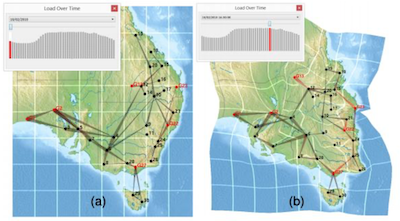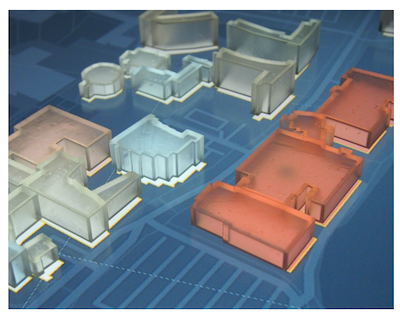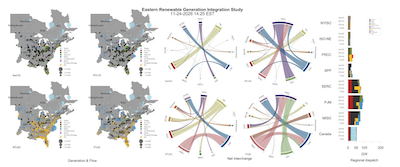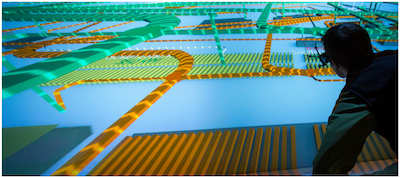EnergyVis 2023
In conjunction with IEEE VIS 2023, Melbourne, Australia. For registration information see the IEEE VIS website.
The energy sector is witnessing significant technological progress, primarily driven by the growth of renewable energy, distributed energy resources, and smart grid technologies. This rapid evolution is generating increasingly large, complex data that present substantial challenges for energy systems planning and operations. For example, previously, distribution feeders had only a handful of sensors and controllable devices; now, with these new technologies, thousands or even tens of thousands of such devices are possible. As a result, energy system models have grown exponentially in planning scenarios from just hundreds of components to millions. Moreover, the adoption of distributed solar generation and grid-aware devices such as smart thermostats and electric vehicles are expanding the breadth of stakeholders, including consumers, engineers, regulators, urban planners, and policymakers, who are trying to understand these energy systems. These new energy systems are generating vast amounts of complex data, which require visualization techniques capable of handling the sheer scale and multifaceted complexity of the information. Unfortunately, much of the visualization supporting these changes is outdated, with simple one-line diagrams and contour plots being over-extended by the data they are being applied to. More research is needed to develop new and innovative visualization methods that can handle the increasing complexity of energy systems and provide a diversity of stakeholders with the necessary insights to make informed decisions about the future of energy.
The EnergyVis 2023 workshop aims to bring together scientists, researchers, and practitioners from the energy and visualization domains to critically assess and discuss energy data visualization in the context of the evolving energy sector. The workshop's main objectives will be to seed the development of a publishable report on the state-of-the-art and grand challenges in energy data visualization, and to develop stronger international collaborations for this important area of multidisciplinary research. To that end, the workshop will discuss:
- • the current state of the art in energy data visualization,
- • the challenges, opportunities, and goals in energy data visualization,
- • the role of visualization in understanding and utilizing energy data from a ``human-in-the-loop'' perspective, and
- • case studies, experiences, lessons learned, and best practices in energy data visualization.
EnergyVis 2023 will be a half-day in-person workshop on 22 October 2023 from 9AM - 12PM AEDT (UTC+11) in Room 103 of Melbourne Convention and Exhibition Centre. EnergyVis will consist of brief paper talks, short invited industry talks and a collaborative interactive brainstorming and discussion with all participants on the common challenges and goals in this domain. The short talks will provide initial prompts for these group discussions.
Participation and RegistrationAre you interested in ENERGY DATA and helping us to dig deeper into understanding the CHALLENGES and OPPORTUNITIES there is in the field of energy data visualization? Pleae join us to have this discussion! Note that all participants, including presenters, must register to attend the workshop at the IEEE VIS website: 1 Day, 2 Day, or Full Week tickets are available. We look forward to seeing you there!
Please contact one of the workshop chairs below if you have any further questions.
- 9h00: Introduction
- 9h05 - 9h50: Paper Presentations and Q&A
- - Alternatives to Contour Visualizations for Power Systems Data . By: Isaiah Lyons-Galante, Morteza Karimzadeh, Sam Molnar, Graham Johnson, Kenny Gruchalla
- - Exploring the Benefits of Geography on Power Network Diagrams . By: Merry Hoang,Sarah Goodwin, Michael Wybrow, Ying Yang
- - Visualization of the Oscillatory Dynamics of an Island Power System . By: Sam Molnar, Kenny Gruchalla, Shuan Dong, Jin Tan
- -Q&A 1: Papers 1-3
- - Virtual Reality for Enhancing Engagement with Net Zero Transitions . By: Amal Alshardy, Sarah Goodwin, Andres Santos-Torres, Ariel Liebman
- - An Interactive, Scenario-Based Visualization Dashboard for Model-to-Model Comparison . By: Erica Attard, Madeleine McPherson
- - Topological Guided Detection of Extreme Wind Phenomena: Implications for Wind Energy . By: Yu Qin, Graham Johnson, Brian Summa
- -Q&A 1: Papers 4-6
- 9h50 - 10h15: Guest Talks and Discussion with:
- - Peter Galey, Head of Network Control and Operations, CitiPower and Powercor.
Peter brings years of experience in electricity network operations as a manager and an engineer, as well as leading strategic asset management planning and improvement programs. As Head of Network Control and Operations, Peter is responsible for real time network operations for CitiPower (Melbourne CBD and inner suburbs) and Powercor (western Victoria) with customers who range from residents, small businesses and major office buildings to health care, education and renewable generators amongst many more. Through his vast experience in the sector he has identified many data communication challenges that he would like to bring to the attention of the visualisation community.
- -Yasmina Dkhissi, City Resilience Strategy Lead, City of Melbourne.
Yasmina leads the City of Melbourne’s major initiative on city resilience. She has a demonstrated track record in working with international stakeholders across university, industry, government and community organisations to deliver innovative solutions to today’s climate and sustainability challenges. Yasmina is experienced in designing and implementing collaborative and multi-disciplinary climate mitigation and adaptation, innovation programs. She has worked as a sustainable innovation strategist in Paris, led the strategy for Monash University’s Net Zero Initiative, has held partnerships and technical research roles, and holds a PhD in next generation solar photovoltaics from the University of Melbourne. Her favourite topics are impact, net-zero transition, climate resilience, cities transformation, co-design, community, systemic innovation and creativity.
- 10h15 - 10h45: Break and Networking
- 10h:45 - 11h:45: Interactive Activity and Brainstorming
- 11h45 - 12h:00: Overview and Next Steps for EnergyVis
We are interested in bringing together multidisciplinary perspectives, especially on the human-centric component of energy visualizations. We invite innovative ideas, design concepts, requirement analysis and work-in-progress relating to the following technical scope:
- Energy visualization contexts smart cities/homes/buildings/grid, network visualizations, energy policy and governance, net zero initiatives, energy consumers and analysis, energy markets, microgrids/nanogrids, and personal energy analytics
- Energy visualization challenges uncertainty visualization, spatio-temporal visualization, large network visualization, micro/macro scale, automated model comprehension
- Disruptive technologies open source, open analytics and open workflows, machine learning, AI, VR/XR, tangible interfaces,
- Data concepts big data, real-time data challenges, open data portals, open standards, forecasting and predictions, quantified self, citizen science
- Human interaction & user-centric design human factors, cognitive load, persuasive methods, co-creation design methods, visualization for decision support and decision making, evaluation methods, stakeholder- & requirement analysis, visualizations for experts vs. general public, energy games and gamification
We are accepting short papers, up to four pages plus up to 1-2 page of references (i.e. max of 6). Submissions will be in the VGTC conference two-column format, in line with the IEEE VIS formatting guidelines.
Papers should be submitted through PCS via VGTC > EnergyVis . Accepted papers also have the option of publishing their work at IEEE Xplore.
- Submission Deadline: July 10, 2023
- Author Notification: August 4, 2023
- Camera-ready submission: August 14, 2023
- Workshop: October 22, 2023
- Kenny Gruchalla National Renewable Energy Laboratory (NREL), USA
- Arnaud Prouzeau Inria Bordeaux, France
- Lyn Bartram Simon Fraser University, Canada
- Sarah Goodwin Monash University, Australia
- Anjana Arunkumar Arizona State University
- Wes Bethel San Francisco State University
- Yousu Chen Pacific Northwest National Laboratory (PNNL)
- Paul Cuffe University College of Dublin
- Johanna Fulda Clir Renewables Inc, Vancouver, BC, Canada
- Alex Godwin American University, Washington D.C.
- Maria Jesus Lobo LASTIG, Université Gustave Eiffel
- Sebastian Meier Hafencity University
- Patrick Mackey Pacific Northwest National Laboratory (PNNL)
- Rex Martin Monash University, Australia
- Sam Molnar National Renewable Energy Laboratory (NREL)
- Luiz "Gusto" Morais Universidade Federal de Pernambuco
- Thomas Overbye Texas A&M University
- Cagatay Turkay University of Warwick
- Bei Wang SCI Institute, University of Utah





